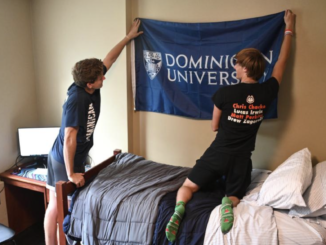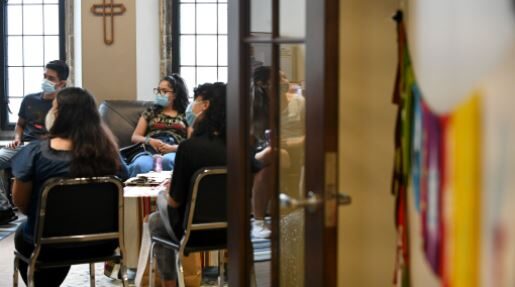
By Chelsea Zhao
Estimated Reading time: 3.5 minutes
The Faith in the Vaccine program collaborates with Interfaith Youth Core to address hesitancy and accessibility regarding the COVID-19 vaccines via faith-based communities.
IFYC offered a grant program for faith-based organizations and universities. The program ran from mid-May to July 31. The ambassadors work 20 hours per week with a weekly one-hour-long reflection.
“They (IFYC) realized early on that faith-based communities were uniquely suited to address issues of hesitancy and accessibility, because people already trust faith communities ,” said Tara Segal, director of the Faith In Vaccine ambassador program.
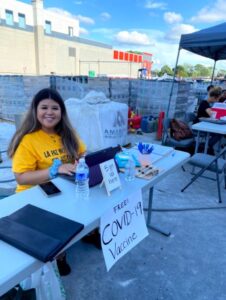
The program received more than 40 applications, out of which 12 students are selected for seven sites throughout Chicagoland: Dominican University, Proviso Township, Austin, Maywood and Little Village, which are all previous community partners with University Ministry.
According to Segal, as of June 21, six ambassadors in less than a month have made more than 420 phone calls, spent more than 93 hours canvassing and vaccinated 153 people.
Two ambassadors also went to summer freshman orientation to inform incoming students and family on vaccine resources and on-campus clinics.
The student ambassadors come from a wide background, from post-baccalaureates to graduate students, to undergraduates, with majors ranging from neuroscience, psychology, nursing, education to marketing.
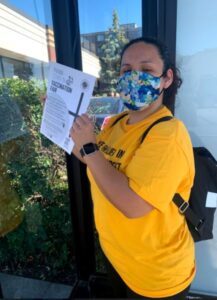
Jamie Pena, who works in the Urban Village/Cosmopolitan church in Melrose Park, said she found a match between her major as a biology major with pre-med concentration in the community-serving aspect.
“I’ve been keeping up to date with everything on the CDC, and it (Faith in Vaccine Program) kind of really caught my attention in regard to playing an important role in the community and being able to work towards the common good ,” Pena said.
Student ambassadors helped to set up and advertise about the vaccine clinics and address questions and anxieties about the vaccine.
“There’s a history of them (community members) being mistreated by the medical community and the government, so they are really reluctant to receive the vaccine. And the ambassadors are working to combat that, ” Segal said.
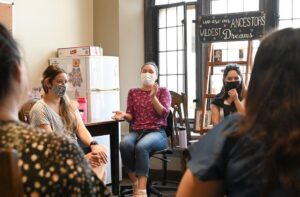
Other than the mental barriers, the tornado warnings in the summer also affected how many people showed up to the clinic. Pena said the expected vaccination shots were reduced due to the weather.
“But at the end of the day, we were just excited simply that about five individuals got vaccinated because every number counts ,” Pena said.
Gabe Allori, a student ambassador at the Quinn Center in Maywood, said his academic experience as a natural science major and theology minor helped him to find common ground with the community members.
“Of course, you’re trying to advocate toward the vaccine, but listening to people, and trying to understand why they may or may not want this (vaccines) is really our job ,” Allori said. “I think with my theology minor, I’m able to use it to kind of have more open perspectives .”
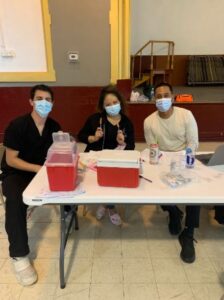
Allori said the center along with the ambassadors help to target teens and middle-aged adults, who have the most hesitancy toward the vaccine. Allori said some of the reasons of concern were that the vaccines are not FDA-approved, were used to test fetal cells, and microchipping, etc.
Director of Civic Learning Paul Simpson and vice president of Student Success and Engagement Barrington Price helped to match the IFYC funding with the internship stipends. The program also partnered with English program director Gemma Ortega , Christina Platt , who teaches health communication, and the Rush University Medical Center.
Student ambassadors report to their respective on-site supervisors, Segal and Gabriella Nicholas, assistant director of the Center for Cultural Liberation.
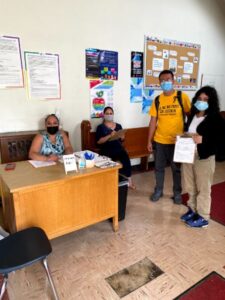
Other than the goal of dispelling fears and getting people vaccinated, Segal said the program also aligns with the curriculum and reinforces personal development for students’ vocational strives.
“I’m very excited to be able to play a role in the community and in the overall work that has been done in the vaccine ,” Pena said. “It’s not a major role that I play but I think at the end of the day, I’m extremely honored and excited that I can play this partial role and helping advocate for the vaccine in our health communities.”
qzhao@my.dom.edu
Photo courtesy of Ryan Pagelow, Nathaly Valdivia and Kristen Garcia @CSPLAction. Link to Parting Water: CSPL Vaccine Outreach Episode P1 is here and Episode P2 is here.
Copy-edited by Shonda Dudlicek


